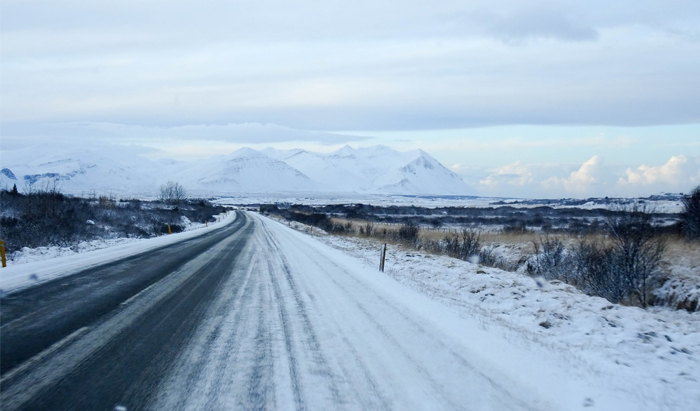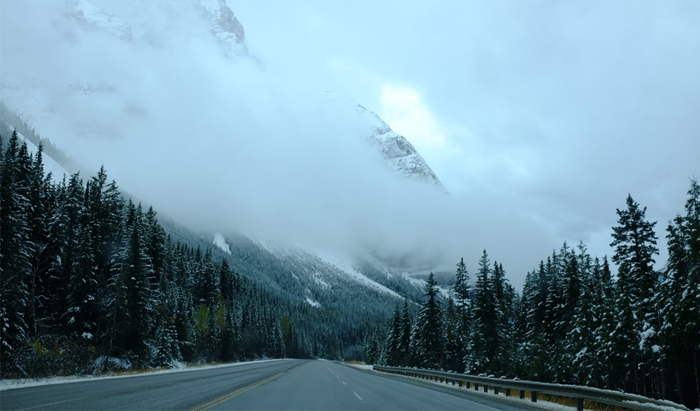As we approach the colder winter months, it’s a great time of year to remind truck drivers to be extra careful on the roads and adjust their driving habits accordingly. Weather conditions and poor visibility can change even the most familiar routes and roads.
It’s important for all drivers to be hyper-aware during this season, but big commercial truck drivers have an extra level of responsibility, as they are in control of very large, powerful vehicles.
But not to worry. By adhering to several preventive safety skills for driving in cold weather, you can safely make it through the winter months without too many issues.
Here are 12 winter safety tips for truck drivers to help you stay safe.
Make Sure Your Rig Is In Shape
First things first, make sure your truck is completely ready for harsh winter driving. This is one of the most important winter safety tips for truck drivers.
Check the tire pressure, engine oil, and antifreeze levels very carefully before starting any trips. It’s also very wise to have a mechanic double-inspect your truck to make sure it’s ready.
Allow Yourself Extra Room
Because the stopping distance on a wet, slick road requires twice the amount of a normal stopping distance, it’s important to allow yourself extra room when driving on them. For icy roads, take ten times the amount of your normal stopping distance.
Many drivers make the mistake of following too closely to the vehicle in front of them in order to follow their tail lights and see in poor weather. Don’t be tempted to do this. It’s absolutely critical to have this safety buffer between your truck and any type of vehicle that may be in front of you so that you can move out of danger if anything unpredictable happens.

The Shoulder Is Not For Stopping
When driving in hard-to-see weather, don’t pull over onto the shoulder. Other vehicles may easily you are on the road, and as a result, they can crash into the back of your truck.
Don’t Be Abrupt
This is one of the most important winter safety tips for truck drivers: during the cold winter months, keep an overall mindset of: don’t make any sudden moves. Any abrupt moves, including braking, acceleration, and turning on slick or icy roads puts you at great risk for an accident.
If you need to suddenly slow down on the road, remember to pump your brakes very lightly. Try to refrain from doing anything that’s going to reduce your traction.
Be Careful With Bridges
In cold weather, bridges will freeze much more quickly than regular roads. Bridges also don’t always get salted or sanded. The same goes for highway overpasses and other elevated surfaces. Because of this, be sure to be very careful when approaching these areas so that you don’t spin out of control.
Use Your Headlights
Because it can be very difficult to see in winter weather, it’s extremely important for truck drivers to remember to turn on their headlights. As one of the most important winter safety tips for truck drivers, not only does this help you see better, it also helps other vehicles on the road to see you and keep a safe distance.

Keep Your Fuel Tanks Filled
For better weight and traction, make sure your fuel tanks are always topped off. This is a lesser know winter safety tip for truck drivers. Also keep in mind that good quality lug tires with proper tire pressure are necessary for good traction on the roads.
Keep Your Lights Clean
The more visible your truck is during the winter months, the better it is. If you have lights on your truck, snow and ice builds up on these (especially LEDs). Make sure you’re keeping them cleaned off with each stop you make. This goes for headlights as well.
Have The Right Equipment
Be sure to have your cold weather essentials with you. This includes:
- Extra layers of warm clothing
- Gloves and a warm hat
- Winter boots
- Flashlight and fresh batteries
- Rain gear
- Shovel
- Matches
- Flares
 Image: soundingsonline.com
Image: soundingsonline.com
- Windshield fluid
- Blankets
- Bag of sand or salt
- Tire chains
- Jumper cables
- Snow scrapers and brushes
- Hand warmers
- Water and food
Also make sure you have roadside assistance ready to help you out.
Stay Smooth And Slow
Unfortunately, many truck drivers don’t adjust their speed during the winter months, and this is one of the biggest reasons why the majority of accidents involving commercial trucks occur during this time of year.
Drivers have to compensate for bad traction on snowy roads by reducing speed. Taking it slower will also allow drivers to have more reaction time if anything goes wrong.
Watch Out For Black Ice
Myth alert! Have you heard that black ice only exists on bridges? If so, know that this is incorrect. It can actually exist on any road. “Black ice” is a layer of thin, transparent ice that doesn’t look like ice. It simply looks like the road is wet, which can obviously be very dangerous.
If you happen to hit black ice, don’t panic. Do as little as possible, and let your truck pass over the ice slowly. Don’t hit the brakes, and try to keep the steering wheel straight. This is one of the most vital winter safety tips for truck drivers.
Don’t Hesitate To Bail Out
Don’t make the same mistake that many truck drivers have in the past! If the weather is getting too severe, pull over. Forget your deadline and concentrate on your safety and the safety of others. Find a way to get off the road and wait it out. Even if you think you can do it, if you begin to worry, get out of there.
These winter safety tips for truck drivers are extremely important to keep in mind during this time of year. Don’t just read about them; put them into practice and follow them very carefully. Keep calm during poor weather, and always stop driving if it gets too bad. Good luck!

